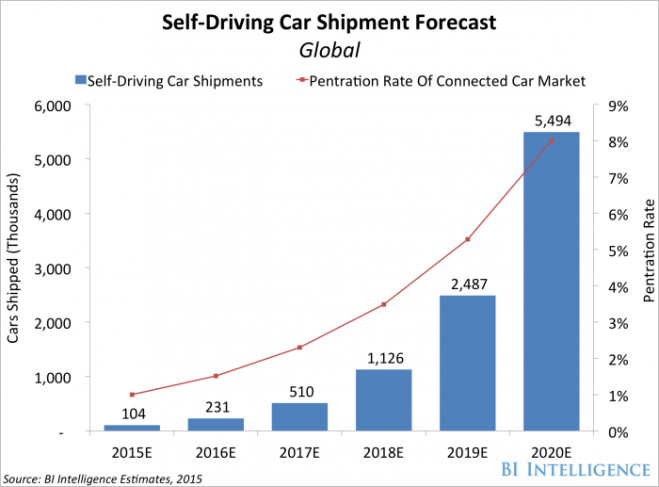How self-driving cars will disrupt auto parts suppliers — Can self-driving cars make ethical choices? — Jasper integrates with IBM
BI Intelligence
SELF-DRIVING CARS WILL UPEND THE AUTOMOTIVE SUPPLY CHAIN: With the rise of self-driving cars on the horizon, traditional auto parts manufacturers will face increasing competition from new suppliers and startups that specialize in components for self-driving cars. This new group of suppliers is already helping companies like Tesla and Google build self-driving vehicles. Here are some of these new suppliers featured in a recent article by re/code:
- Canada-based Magna International sells technology and components for driver assistance features like lane departure warning systems. Those driver assistance features are considered precursors for self-driving cars, and require some of the same hardware components like sensors and radar. Magna has a full vehicle-assembly subsidiary, so it could potentially assemble a self-driving car for Google, Apple, Uber, or other companies looking to develop self-driving cars.
- Velodyne has been producing LIDAR systems for a decade. LIDAR systems help self-driving cars measure the distance between themselves and other objects, like other cars or pedestrians on the road. Velodyne provides parts for the LIDAR systems in Google’s self-driving cars, and produces three different LIDAR systems: an $80,000 unit for trucks, a $32,000 unit, and a recently released “Puck” unit for $8,000. The company expects the two cheaper units will be in high demand as adoption of self-driving cars grows.
- Israel-based Mobileye provides a high-tech camera that can serve as an alternative to LIDAR systems. Tesla uses its cameras, and GM is testing them with new models of the Chevy Volt. The camera is part of a full software and hardware package that provides a 360-degree view around the vehicle and costs less than $1,000.
- Nvidia is the leading supplier of chips that provide processing power for cars right now. Tesla and Google are already using its chips, which can process streaming data from up to 12 cameras, as well as from LIDAR systems and sensors. Nvidia’s automotive unit grew annual sales by 85% in its last fiscal year, although it faces growing competition from other chips suppliers like Qualcomm and Samsung looking to jump on the huge market opportunity in computing chips for vehicles.
AUTONOMOUS CARS AND ETHICAL CHOICES: One of the significant challenges still remaining to the adoption of fully autonomous vehicles is how they will make choices to minimize damage in an accident, a recent MIT Technology Review article said. For instance, if something goes wrong and an autonomous car is about to hit a group of pedestrians, should it swerve out of the way, even if it could hit a wall and kill the car’s occupant? In other words, should the car minimize loss of life by avoiding the pedestrians, or risk the life of the occupant?
This question might seem like a faraway, abstract exercise, but with several automakers lining up to launch self-driving cars over the next few years, it will soon become a real dilemma for automakers and their customers. The question also goes to the heart of how much the public really trusts autonomous vehicles: will they trust them even in life-threatening situations?
It turns out they don’t. Researchers at the Toulouse School of Economics in France asked hundreds of people whether they think an autonomous car should swerve out of the way of 10 pedestrians even if it guaranteed that the car would crash and kill its owner. In general, the respondents said that the car should be programmed to minimize the death toll, even if it killed the occupant. However, the majority of the respondents said they wouldn’t drive themselves in a car programmed to do that.
This is why many industry experts expect that even though self-driving cars will hit the market relatively soon, it will be many years before steering wheels are removed from them. Consumers will want the ability to take control of the car in a dire situation. If consumers want to do that, than automakers will likely require that they keep their hands on the steering wheel when the car is self-driving to avoid liability in the case of an accident, just as Tesla is doing with its Autopilot mode.

JASPER INTEGRATES WITH IBM’S IOT FOUNDATION: Jasper, an IoT platform provider, announced this week that it is integrating its Control Center with IBM’s IoT Foundation platform. This will tie together the Control Center’s device management and task automation capabilities with IBM’s application development, data management, and analytics tools.
This combination will help enterprises bring services for their IoT devices to market much faster by combining all of these capabilities into a single solution. For example, an enterprise could manage a fleet of vehicles using the integrated solution, automating alerts and notifications for predictive maintenance while gathering and analyzing vehicles’ speed and location data to optimize routes and cut fuel costs.
Jasper has already integrated its platform with several other major enterprise IT providers including SAP, Microsoft, and Salesforce to offer device management and task automation capabilities for IoT devices through those providers’ platforms as well. Adding Jasper’s capabilities helps these providers offer a one-stop shop for IoT device, network, and data management and analytics.
